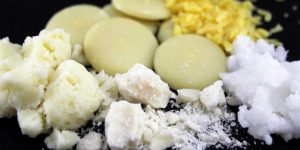 Ingredients are obviously core when it comes to skincare, but the trick is separating the reality from exaggeration to really know what we’re getting in a purchase.
Ingredients are obviously core when it comes to skincare, but the trick is separating the reality from exaggeration to really know what we’re getting in a purchase.
#1 Hypoallergenic
It’s great to not have products that cause allergic reactions. However, it’s important to remember that there are no guidelines, ingredient restrictions, tests, or regulations to identify whether or not a product qualifies as “hypoallergenic.” People react to different things, and some people are more sensitive to others. Purchasing a “hypoallergenic” product does not guarantee that you won’t get an allergic reaction. If you have sensitive skin, then simply steer clear of common irritants such as fragrances, color, and essential oils.
#2 Non-Comedogenic
First, it’s important to define what “non-comedogenic” means. A “comedo” is thickened secretion plugging a skin duct, commonly known as a blackhead. So when a product claims to be “non-comedogenic,” it implies that it won’t cause you to have acne—or more specifically—clogged pores. This is nice to hear, but acne is, unfortunately, natural. Clogged pores come about when your body produces too much sebum, or oil, which then combines with dead skin cells. When getting facial cleansers, it’s important to know that facial cleansers do just that. They cleanse…but they don’t stop your body from producing oils. Moreover, there exists no specific regulation or process identifying what companies must do to a product for it to be qualified as “non-comedogenic.”
#3 Anti-Aging
This is a bit of a broad topic, but it’s important to know that skin is not an age. People of the same age have different skin types. However, when wrinkles do occur, it’s important to know that simply drinking a lot of water and putting on moisturizer won’t do the trick. It’s important to know that wrinkles occur as a natural reaction to intrinsic and extrinsic aging. Intrinsic is unavoidable—diminished action from your oil and sweat glands and reduced collagen production. Extrinsic aging, which comes from sun damage and environmental factors (pollution, smoking, etc.), can be prevented by wearing sunscreen and avoiding tobacco and other harmful products.
More important, say the skincare researchers at Adore Cosmetics, is to understand which ingredients actually have helpful anti-aging effects. For example, Vitamin C has had proven effects on wrinkles in a range of dermatological studies, so it makes sense to look at products with this substance. Other antioxidants—like vitamin E—are also important. In addition, peptides and hyaluronic acid also have strong clinical evidence supporting their effects in promoting healthier-looking (and younger-looking) skin.
#4 “Natural” Products
In surveys, beauty consumers say they favor products with natural ingredients, probably because they think that natural products are better for the skin. This isn’t necessarily true: synthetic ingredients can be just as beneficial or as harmful as natural ingredients. In addition, the term “natural” for cosmetic products is loosely regulated. For example, a company can use a certain organic product, but once it has been processed and purified, the product is far from its original state.
